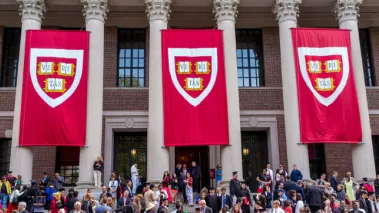Table of Contents
Harvard’s Double Standard on the Role of Student Organizations

f11photo / Shutterstock.com
On Friday afternoon, Harvard College Dean Rakesh Kurana sent a letter to Harvard President Drew Faust, recommending that Harvard take aggressive steps to deter students from joining off-campus, single-sex organizations. That same afternoon, President Faust sent a responsive letter agreeing with the proposal. The exchange had the appearance of a meticulously choreographed, formalistic ritual of a sort usually reserved for meetings of heads of state.
As we explained on Friday, Harvard seeks to deter students from joining these unrecognized organizations by prohibiting their members from holding leadership positions on (single-sex!) athletics teams and recognized student organizations, and from receiving Dean’s recommendation letters for Rhodes and Marshall scholarships.
Harvard’s rationale relied fairly heavily on the notion that student and alumni organizations—which operate independently of Harvard—represent the university:
Students will decide for themselves whether to engage with these organizations, as members or otherwise. But just as students have choice, so too the College must determine for itself the structure of activities that it funds or endorses (including through fellowship recommendations from the dean), or that otherwise occur under its auspices. Captains of intercollegiate sports teams and leaders of organizations funded, sponsored, or recognized by Harvard College in a very real sense represent the College.
That’s a curious statement, for two reasons.
First, Harvard’s targets are organizations that aren’t funded or endorsed by Harvard—the organizations it supposedly “endorses” are merely the tools Harvard is using to pressure outside groups. Few people, outside of current Harvard students, would recognize whether the vice-president of the Harvard Undergraduate Beekeepers club (to pick one organization entirely at random) is also a member of a secretive “final club.” (Remember, the clubs’ membership is a secret. Unless Harvard is going to establish some kind of analog to the House Un-American Activities Committee to pair with its blacklist, the enforcement of this will be even more arbitrary than the usual run of university procedures.)
Second, Harvard’s claim that it can dictate the values of its student organization leaders because they “represent” Harvard departs from the commonly understood wisdom that student organizations do not represent the university—a point Harvard itself has made frequently. Indeed, the university, in addition to prohibiting organizations from purporting to represent Harvard, has repeatedly distanced itself from controversial student organizations and publications when faced with controversies concerning their activities:
One: In response to the H-Bomb, a student-run magazine featuring “nude pictures of Harvard undergraduates and articles about sexual issues”:
Associate Dean of the College Judith H. Kidd said officially approved organizations do not necessarily represent the views of the College.
Two: In response to the “Harvard College Munch,” a student organization formed “to discuss issues and topics relating to kinky sex”:
Harvard spokesman Jeff Neal said the school recognizes more than 400 independent student organizations, and the groups are required to submit an organizational constitution and agree to the school’s nondiscrimination and anti-hazing policies. Then, their fate is decided by a committee composed of students and administrators.
“The college does not endorse the views or activities of any independent student organization,” Neal told FoxNews.com. “Rather, it ensures that independent student organizations remain in compliance with all applicable provisions of the Handbook for Students.”
Three: Harvard spokesman Jeff Neal repeated this mantra in response to a “Christian journal run by Harvard College undergraduates [which] published an essay on its blog by an anonymous Jewish convert to Christianity who said that Jews killed Jesus and therefore deserve God’s wrath”:
Harvard spokesman Jeff Neal said the college does not endorse the views of any of its more than 400 student organizations. “As an institution of higher education, free expression is one of our fundamental principles,” he said in a statement.
The Harvard Ichthus, like many other student groups, received funding from the undergraduate student government.
Six Six Six Four: Harvard made clear that it was not affiliated with Satan, distancing itself, in a now-deleted statement, from a Satanic black mass planned by students:
Students at Harvard Extension School, like students at colleges across the nation, organize and operate a number of independent student organizations, representing a wide range of student interests.
Harvard Extension School does not endorse the views or activities of any independent student organization. But we do support the rights of our students and faculty to speak and assemble freely.
So, which is it? Do student leaders “represent” Harvard only when participating in same-sex organizations, but not when holding a Satanic black mass or publishing nude photos of themselves? To be sure, Harvard’s previous disinclination in these matters to interfere with student speech and affiliation was welcome. But saying it must act now because students “represent” Harvard, when it previously declined to act because students didn’t “represent” Harvard, is laughable.
Colleges cannot credibly claim to value free expression and association when it suits their messaging, then abandon that commitment when it conflicts with administrators’ goals. Doing so betrays that commitment as shallow, if it exists at all.
Recent Articles
Get the latest free speech news and analysis from FIRE.

Remembering 'free-thinking' writer Nat Hentoff
Podcast

VICTORY: Court vindicates professor investigated for parodying university’s ‘land acknowledgment’ on syllabus

Can the government ban controversial public holiday displays?
